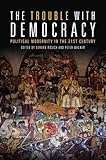The Trouble with Democracy : Political Modernity in the 21st Century / Gerard Rosich, Peter Wagner.
Material type: TextPublisher: Edinburgh : Edinburgh University Press, [2022]Copyright date: ©2016Description: 1 online resource (304 p.)Content type:
TextPublisher: Edinburgh : Edinburgh University Press, [2022]Copyright date: ©2016Description: 1 online resource (304 p.)Content type: - 9781474407984
- 9781474407991
- 321.8
- JC423
- online - DeGruyter
- Issued also in print.
| Item type | Current library | Call number | URL | Status | Notes | Barcode | |
|---|---|---|---|---|---|---|---|
 eBook
eBook
|
Biblioteca "Angelicum" Pont. Univ. S.Tommaso d'Aquino Nuvola online | online - DeGruyter (Browse shelf(Opens below)) | Online access | Not for loan (Accesso limitato) | Accesso per gli utenti autorizzati / Access for authorized users | (dgr)9781474407991 |
Frontmatter -- Contents -- Acknowledgements -- 1 Introduction: Re-Interpreting Democracy for Our Time -- 2 Autonomy in and between Polities: Democracy and the Need for Collective Political Selves -- 3 Rethinking 'Modern' Democracy: Political Modernity and Constituent Power -- 4 Democratic Surplus and Democracy-in- Failing: On Ancient and Modern Self- Cancellation of Democracy -- 5 Setbacks of Women's Emancipation (Condition, Consequence, Measure and Ruse) -- 6 Political Modernity, Democracy and State-Society Relations in Latin America: A New Socio-Historical Problématique? -- 7 Communitarian Cosmopolitanism: Argentina's Recuperated Factories, Neoliberal Globalisation and Democratic Citizenship. An Arendtian Perspective -- 8 Middle-Classing in Roodepoort: Unexpected Sites of Post-Apartheid 'Community' -- 9 Democracy and Capitalism in Europe, Brazil and South Africa -- 10 From Realism to Activism: A Critique of Resignation in Political Theory -- 11 The World as We Find It: A Suggestion for a Democratic Theory for Our Times -- 12 Epilogue: Democracy as Capacity for Self-Transformation -- Index
restricted access online access with authorization star
http://purl.org/coar/access_right/c_16ec
Shows why the perception that we live in an era of human rights and incessant democratisation is dangerously misleadingWestern political thought has long maintained that democracy, once achieved, is here to stay. This view appears to be supported by successive 'waves of democratisation' across the world but, in truth, the political situation of our time is much more ambiguous. On the one hand, the commitment to democracy seems to be more widely shared than ever; on the other, popular will has ever less impact on political decisions because of alleged constraints in an era of 'globalisation'. Existing democracies suffer from a combination of technocratic governance and populist reactions. Global political communication has foundered with addressing urgent problems such as climate change, global social justice and economic-financial crises.By placing political condition of our time in its long-term historical context, this book radically reconsiders key issues of political thought and gives you a comparative exploration of the current experiences of democracy in several world-regions.Key FeaturesCase studies include: Latin America, Argentina, South Africa and BrazilDiscusses topics including contemporary political transformation and its relation to democracy, capitalism and democracy and women's history
Issued also in print.
Mode of access: Internet via World Wide Web.
In English.
Description based on online resource; title from PDF title page (publisher's Web site, viewed 24. Mai 2022)


